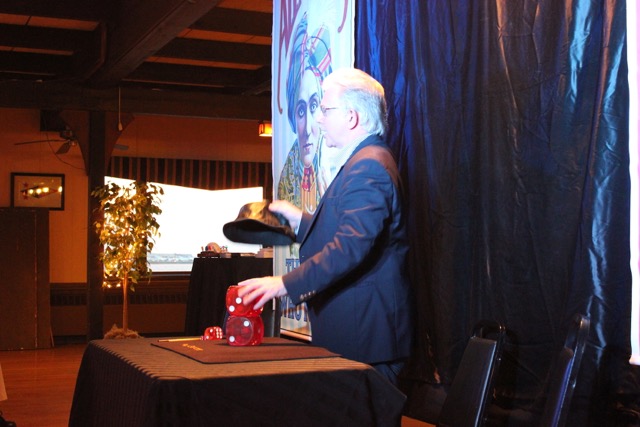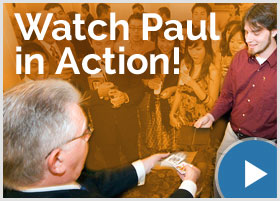Through Lines and Blind Spots
Do you know what your audience sees?

What does your audience see when you step on stage? What do you want them to know about you? How do you want to be perceived in their mind? All of these things are under our control… to a degree. Understanding what your audience sees when you walk on stage is critical. This will help you select material, create a character, develop a through line and most importantly avoid blind spots that can detract from your show. Let me explain.
My Through Line and Blind Spot
Many years ago when I was in my early 20’s, I was beginning to perform at trade shows in a three-piece Brook Brothers suit. I was doing a dice and hat routine inspired by Don Alan and as I produced the last large die, I started using the line “But where in the hell did that come from?”


I probably had seen another performer use that line and he got a big laugh and I started to use it too. I performed it that way for a couple of years until Howard Schwarzman took me aside at one of the early FFFF Conventions and said: “Why do you use that line at the end of the dice trick?” I said: “It gets a big laugh.” Howard said: “But it’s not a good laugh… I love that routine but I hate it when you say the word hell… it just does not fit you.” He went on to explain that I had the look of a young clean cut corporate executive (which was the look I was going for) and to hear a swear word come out of my mouth (even a minor one) just did not fit with my image or the rest of my act. I began asking other magicians and they all agreed…. they too found it “jarring” to hear that word come out of my mouth. Why did I not see the problem? I thought it was a great moment because it made people laugh… but it really was simply a blind spot.
More recently I was reminded of “blind spots” while I watched a very experienced professional performer at a convention. He had the good looks of a movie star and was dressed in a suit that was perfectly tailored and you could tell was very expensive. His act was funny, deceptive and amazing… 100% professional in every way. It was the first time I had seen him live and his through line was of someone that was sophisticated, worldly, funny, witty and a perfect gentleman. And then during his act he asked a spectator, a young lady in her twenties (younger than him) to reach into his front trouser pocket to remove her signed card… not once… but three times. Yes… it did get a laugh from the audience (an uncomfortable one) but the action did not fit his character at all. I turned to the guy beside me and said: ”A real gentleman would not do that.” And later when I spoke with my wife who was sitting in a different part of the theater and asked what she thought about the act? She said she did not see the entire act because as soon as he asked the lady to reach into his pocket she got up and left. Aside from that one small moment, the act was perfect in every respect… but that moment loomed large and detracted from the otherwise perfect through line the performer obviously worked to hard to perfect. It was a blind spot and it was a distraction because it did not match the perception the audience had created about this performer in their mind.
The Power of Audience Impression
One of my friends told me of an actor’s workshop they participated in a few years back that sounded fascinating. Part of the workshop involved each participant simply walking on stage and sitting down and doing absolutely nothing. And a group of 100 people…. just regular people off the street who made up the audience would sit there and write down their impressions about the performer. The performer did not do ANYTHING but walk out and sit down… and yet there was a remarkable consistency in what the audience saw in each performer even though the performer never even opened their mouth. And these audiences were brutally honest… they would write down exactly what they saw… both negative and positive simply based on their first impressions. I’m told it was not for those with a fragile ego, but it provided extremely valuable information for those that were willing to go through the process.
The simple fact is, audiences make up their minds very quickly. Do they see you as sophisticated, funny, intelligent, precise, silly, serious, pathetic, weird, dangerous, unstable, goofy, handsome, sexy, scary, bumbling, mysterious, comical or strange? Chances are they probably see you as a combination of a number of things. For example, Michael Finney plays the role of someone who is funny, sarcastic and vulnerable all at the same time. To me, Dan Sperry is scary, unpredictable and bizarre. Most of us are a combination of multiple traits. And it is critical that we understand what those traits are so that we can either play to those perceptions… or even more interesting… play directly against those perceptions. For example, watching Don Rickles, I always had the feeling that he was a really nice guy, a softy at heart… he even called himself Mr. Warmth, and then he came out and was rude to everyone in the audience and it was hilarious to watch… but deep down we could tell he was probably a really nice guy.
It is also important to understand that as we age, our through lines will change and a good performer will adjust to that new reality. Billy McComb was a perfect example of a performer that adjusted to a new through line as he aged… joking about having to end the show a little early because “Tonight is rice pudding night back at the home.”
The thing to remember is that blind spots are sometimes very hard to see when we are standing on stage, so listen to your audience and to friends that you trust. If a fellow performer asks you the question “Why do you do (or say) that during that trick?” don’t get defensive. That is a good time to open a dialogue and you might discover that the audience is seeing or hearing something different than you think they are. Your friend may be trying to help point out a blind spot in your act that you have not seen yet. After all, that’s why they are called blind spots.
Sorry, comments for this entry are closed at this time.














No Comments Yet
You can be the first to comment!